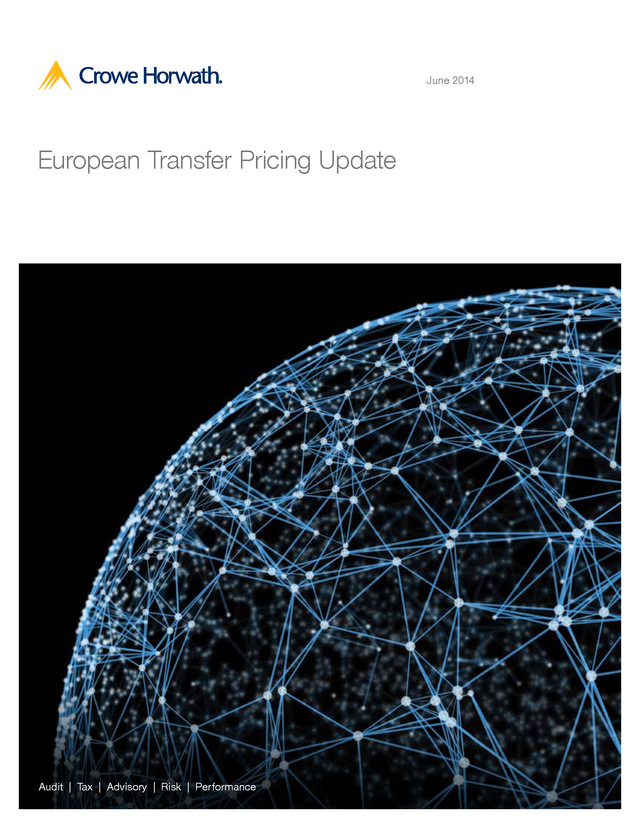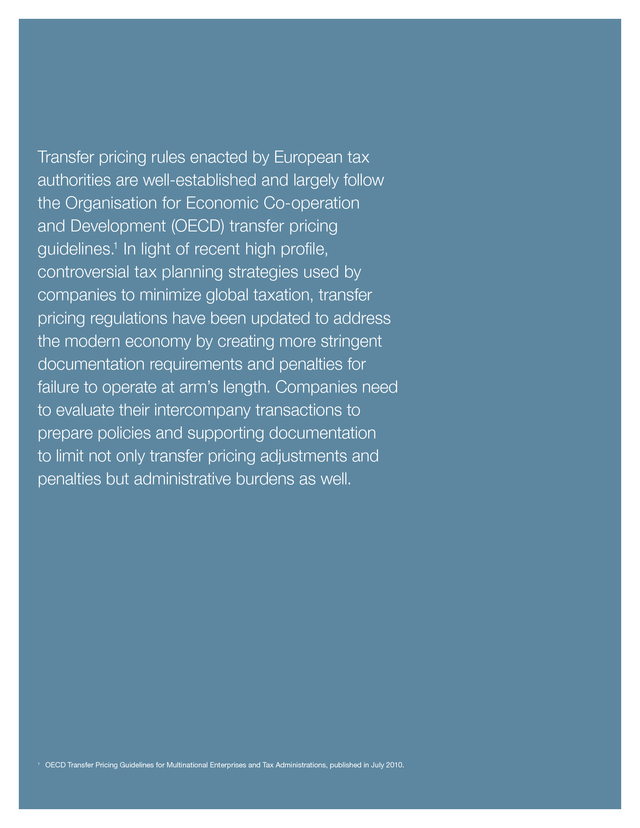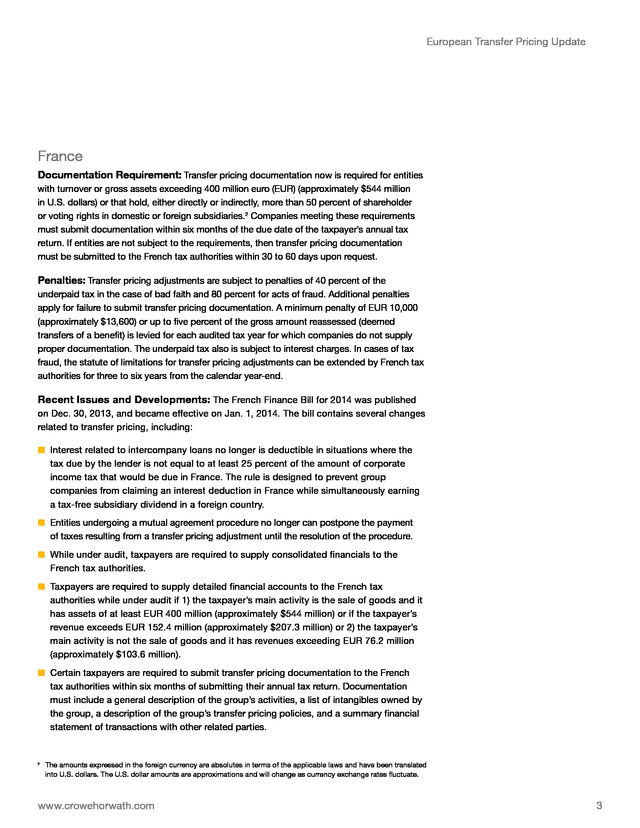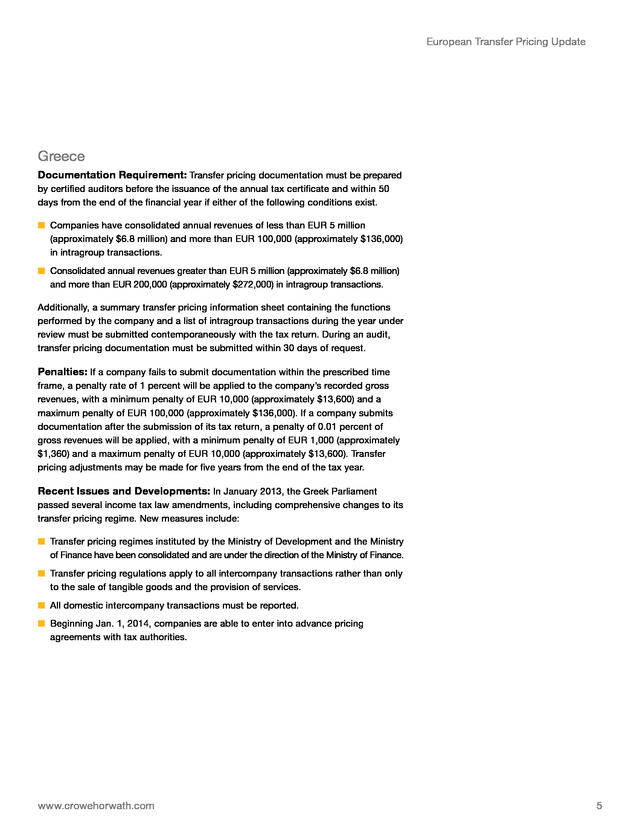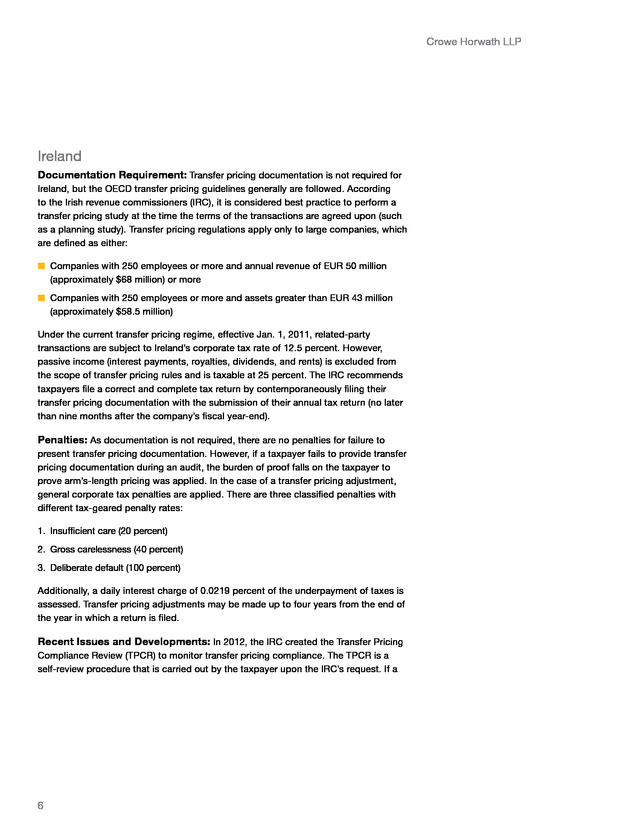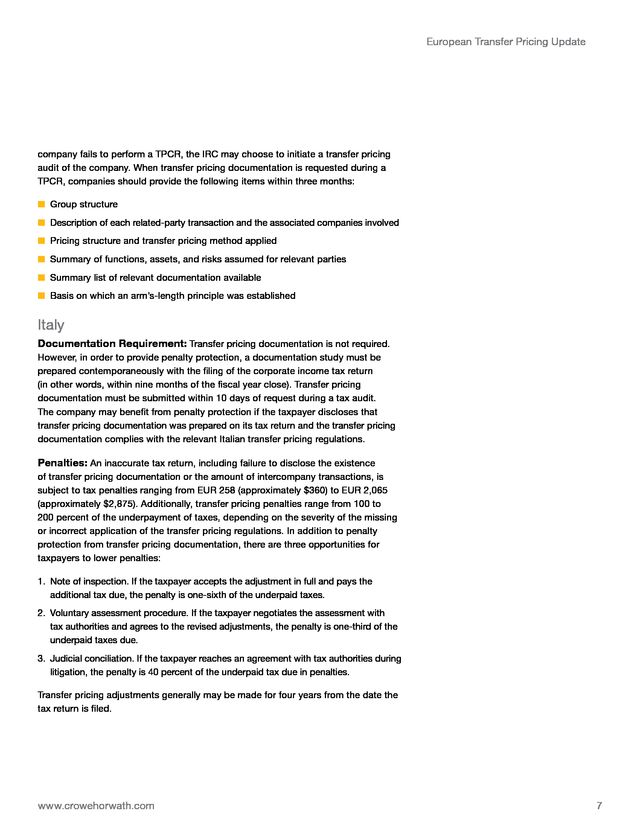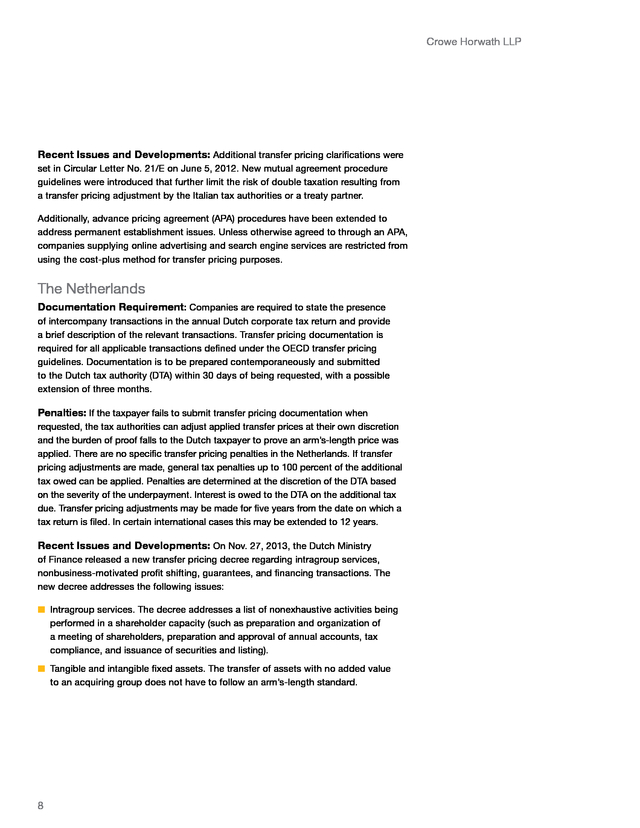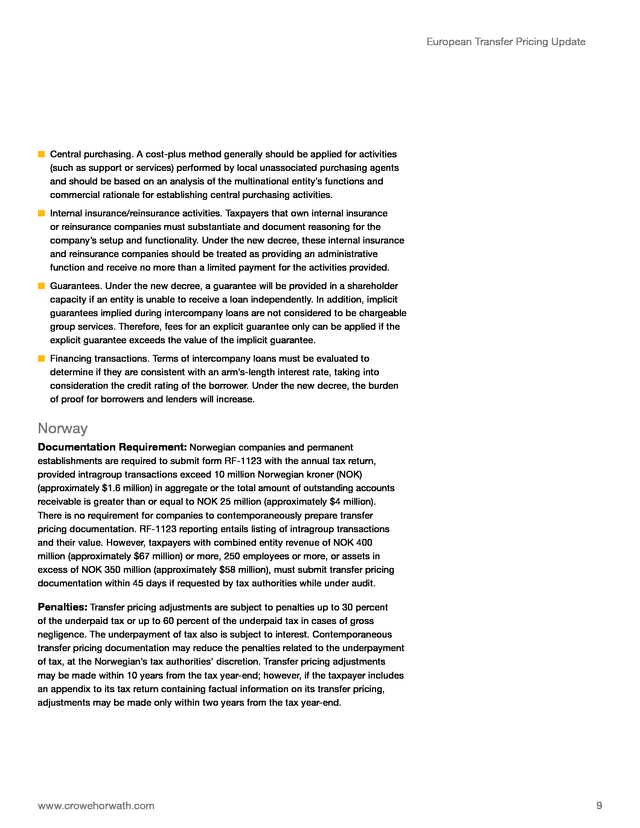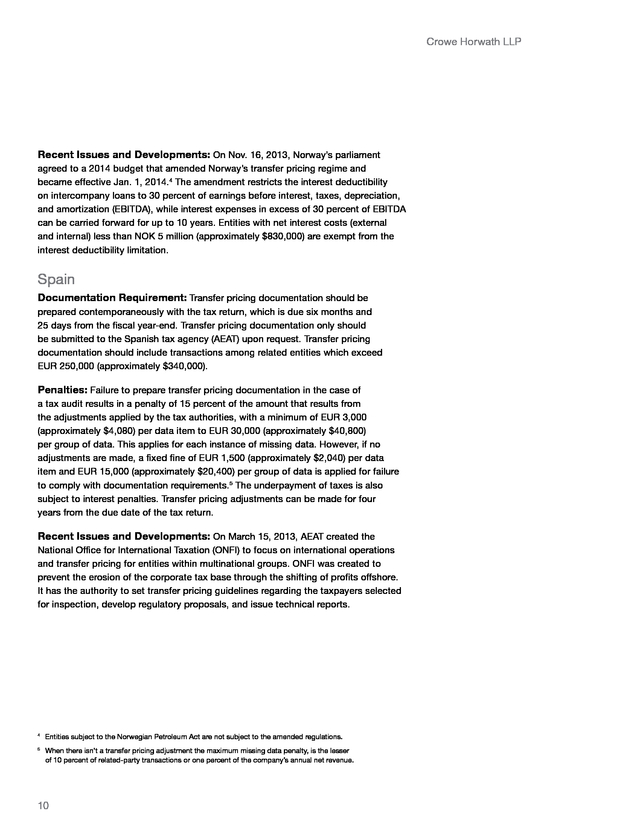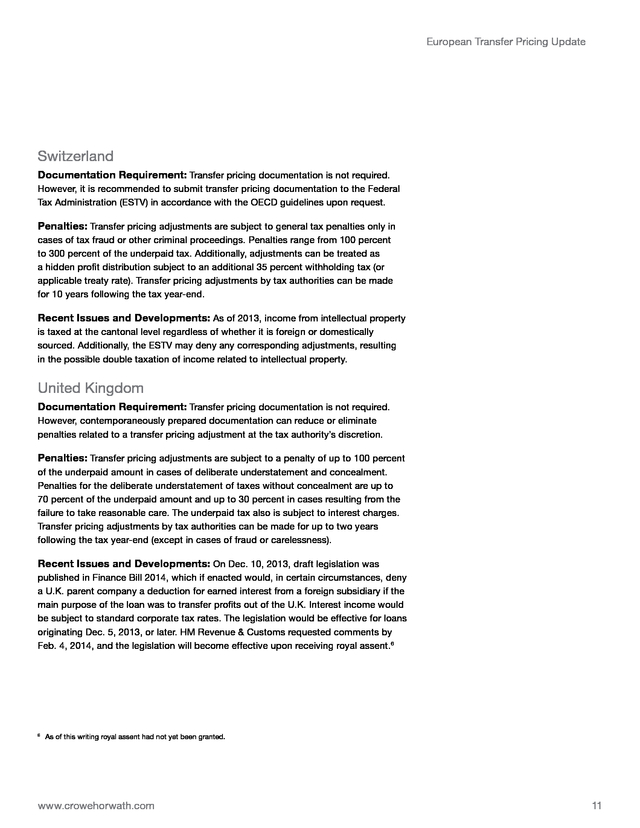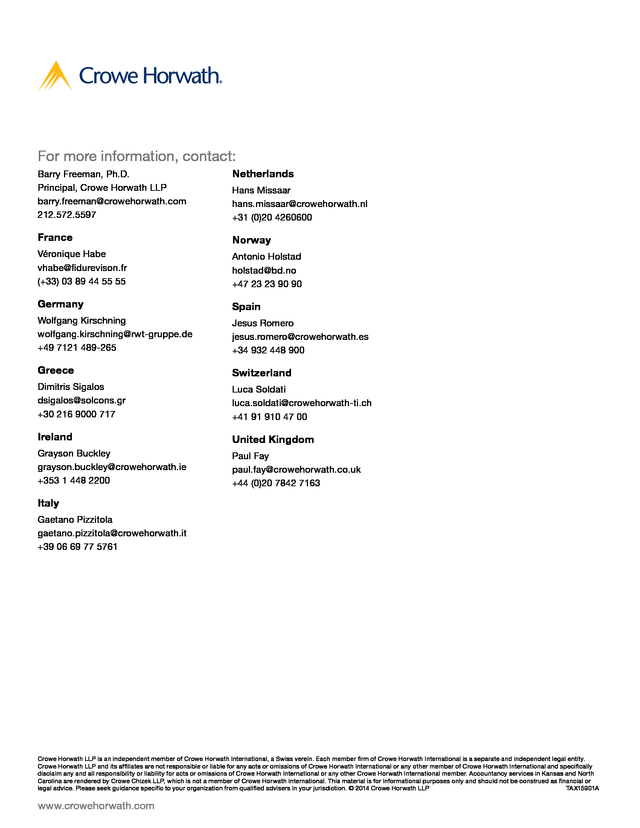European Transfer Pricing Update - controversial tax planning strategies used by companies
Crowe Horwath
Description
June 2014
European Transfer Pricing Update
Audit | Tax | Advisory | Risk | Performance
www.crowehorwath.com
. Transfer pricing rules enacted by European tax
authorities are well-established and largely follow
the Organisation for Economic Co-operation
and Development (OECD) transfer pricing
guidelines.1 In light of recent high profile,
controversial tax planning strategies used by
companies to minimize global taxation, transfer
pricing regulations have been updated to address
the modern economy by creating more stringent
documentation requirements and penalties for
failure to operate at arm’s length. Companies need
to evaluate their intercompany transactions to
prepare policies and supporting documentation
to limit not only transfer pricing adjustments and
penalties but administrative burdens as well.
1
OECD Transfer Pricing Guidelines for Multinational Enterprises and Tax Administrations, published in July 2010.
. European Transfer Pricing Update
France
Documentation Requirement: Transfer pricing documentation now is required for entities
with turnover or gross assets exceeding 400 million euro (EUR) (approximately $544 million
in U.S. dollars) or that hold, either directly or indirectly, more than 50 percent of shareholder
or voting rights in domestic or foreign subsidiaries.2 Companies meeting these requirements
must submit documentation within six months of the due date of the taxpayer’s annual tax
return. If entities are not subject to the requirements, then transfer pricing documentation
must be submitted to the French tax authorities within 30 to 60 days upon request.
Penalties: Transfer pricing adjustments are subject to penalties of 40 percent of the
underpaid tax in the case of bad faith and 80 percent for acts of fraud. Additional penalties
apply for failure to submit transfer pricing documentation.
A minimum penalty of EUR 10,000 (approximately $13,600) or up to five percent of the gross amount reassessed (deemed transfers of a benefit) is levied for each audited tax year for which companies do not supply proper documentation. The underpaid tax also is subject to interest charges. In cases of tax fraud, the statute of limitations for transfer pricing adjustments can be extended by French tax authorities for three to six years from the calendar year-end. Recent Issues and Developments: The French Finance Bill for 2014 was published on Dec.
30, 2013, and became effective on Jan. 1, 2014. The bill contains several changes related to transfer pricing, including: â– â– Interest related to intercompany loans no longer is deductible in situations where the tax due by the lender is not equal to at least 25 percent of the amount of corporate income tax that would be due in France.
The rule is designed to prevent group companies from claiming an interest deduction in France while simultaneously earning a tax-free subsidiary dividend in a foreign country. â– â– Entities undergoing a mutual agreement procedure no longer can postpone the payment of taxes resulting from a transfer pricing adjustment until the resolution of the procedure. â– â– While under audit, taxpayers are required to supply consolidated financials to the French tax authorities. â– â– Taxpayers are required to supply detailed financial accounts to the French tax authorities while under audit if 1) the taxpayer’s main activity is the sale of goods and it has assets of at least EUR 400 million (approximately $544 million) or if the taxpayer’s revenue exceeds EUR 152.4 million (approximately $207.3 million) or 2) the taxpayer’s main activity is not the sale of goods and it has revenues exceeding EUR 76.2 million (approximately $103.6 million). â– â– Certain taxpayers are required to submit transfer pricing documentation to the French tax authorities within six months of submitting their annual tax return. Documentation must include a general description of the group’s activities, a list of intangibles owned by the group, a description of the group’s transfer pricing policies, and a summary financial statement of transactions with other related parties. 2 The amounts expressed in the foreign currency are absolutes in terms of the applicable laws and have been translated into U.S. dollars.
The U.S. dollar amounts are approximations and will change as currency exchange rates fluctuate. www.crowehorwath.com 3 . Crowe Horwath LLP Germany Documentation Requirement: Transfer pricing documentation no longer is required to be contemporaneously prepared. However, documentation should be prepared contemporaneously because 1) documentation must be prepared for extraordinary transactions (such as corporate restructurings and long-term contracts) within six months of the corporate year-end and submitted to the tax authorities within 30 days of request, and 2) documentation for all other transactions must be submitted within 60 days upon request from the tax authorities. Penalties: If a company fails to submit documentation within 60 days upon request, they are subject to a minimum late-filing fee of EUR 100 (approximately $136) per day with a maximum fee of EUR 1 million (approximately $1.4 million).3 Adjustments made by tax authorities will be subject to a penalty of the greater of EUR 5,000 (approximately $6,800) or five to 10 percent (subject to tax authorities’ discretion) of the underpaid tax, with a EUR 1 million (approximately $1.4 million) maximum penalty. Taxpayers can be eligible for relief if revenues are less than EUR 5 million (approximately $6.8 million) and intercompany transactions are less than EUR 500,000 (approximately $680,000). Transfer pricing adjustments may also be subject to 15 percent (or applicable treaty rate) withholding taxes if the tax authorities characterize the adjustment as a hidden dividend distribution.
Transfer pricing adjustments may be made up to four years from the end of the tax year. Recent Issues and Developments: The Federal Ministry of Finance issued the final version of the German Annual Tax Act of 2013 to address the arm’s-length principle for permanent establishments. The act introduces the authorized OECD approach (AOA) as an amendment to the Section 1 of the Foreign Transactions Tax Act. The AOA allocates assets and the establishment of transactions between a principal and permanent establishment through 1) performing a functional and risk analysis for the principal and permanent establishment and 2) using the arm’s-length standard to establish transaction pricing.
The law further adds that transactions between foreign permanent establishments and domestic permanent establishments should be treated identically to transactions among two independent entities, applying the separate legal entity approach. This decree aligns the German permanent establishment laws with the OECD transfer pricing guidelines. AOA also redefines the term “business relationship,” previously defined as a creditor-debtor relationship, to represent economic operations including transactions between a principal and foreign permanent establishment. 3 The daily penalty levied may be greater than EUR 100 (USD 136) per day and is determined at the discretion of the tax authority based on the company’s revenues. 4 .
European Transfer Pricing Update Greece Documentation Requirement: Transfer pricing documentation must be prepared by certified auditors before the issuance of the annual tax certificate and within 50 days from the end of the financial year if either of the following conditions exist. â– â– Companies have consolidated annual revenues of less than EUR 5 million (approximately $6.8 million) and more than EUR 100,000 (approximately $136,000) in intragroup transactions. â– â– Consolidated annual revenues greater than EUR 5 million (approximately $6.8 million) and more than EUR 200,000 (approximately $272,000) in intragroup transactions. Additionally, a summary transfer pricing information sheet containing the functions performed by the company and a list of intragroup transactions during the year under review must be submitted contemporaneously with the tax return. During an audit, transfer pricing documentation must be submitted within 30 days of request. Penalties: If a company fails to submit documentation within the prescribed time frame, a penalty rate of 1 percent will be applied to the company’s recorded gross revenues, with a minimum penalty of EUR 10,000 (approximately $13,600) and a maximum penalty of EUR 100,000 (approximately $136,000). If a company submits documentation after the submission of its tax return, a penalty of 0.01 percent of gross revenues will be applied, with a minimum penalty of EUR 1,000 (approximately $1,360) and a maximum penalty of EUR 10,000 (approximately $13,600). Transfer pricing adjustments may be made for five years from the end of the tax year. Recent Issues and Developments: In January 2013, the Greek Parliament passed several income tax law amendments, including comprehensive changes to its transfer pricing regime.
New measures include: â– â– Transfer pricing regimes instituted by the Ministry of Development and the Ministry of Finance have been consolidated and are under the direction of the Ministry of Finance. â– â– Transfer pricing regulations apply to all intercompany transactions rather than only to the sale of tangible goods and the provision of services. â– â– All domestic intercompany transactions must be reported. â– â– Beginning Jan. 1, 2014, companies are able to enter into advance pricing agreements with tax authorities. www.crowehorwath.com 5 . Crowe Horwath LLP Ireland Documentation Requirement: Transfer pricing documentation is not required for Ireland, but the OECD transfer pricing guidelines generally are followed. According to the Irish revenue commissioners (IRC), it is considered best practice to perform a transfer pricing study at the time the terms of the transactions are agreed upon (such as a planning study). Transfer pricing regulations apply only to large companies, which are defined as either: â– â– Companies with 250 employees or more and annual revenue of EUR 50 million (approximately $68 million) or more â– â– Companies with 250 employees or more and assets greater than EUR 43 million (approximately $58.5 million) Under the current transfer pricing regime, effective Jan. 1, 2011, related-party transactions are subject to Ireland’s corporate tax rate of 12.5 percent.
However, passive income (interest payments, royalties, dividends, and rents) is excluded from the scope of transfer pricing rules and is taxable at 25 percent. The IRC recommends taxpayers file a correct and complete tax return by contemporaneously filing their transfer pricing documentation with the submission of their annual tax return (no later than nine months after the company’s fiscal year-end). Penalties: As documentation is not required, there are no penalties for failure to present transfer pricing documentation. However, if a taxpayer fails to provide transfer pricing documentation during an audit, the burden of proof falls on the taxpayer to prove arm’s-length pricing was applied.
In the case of a transfer pricing adjustment, general corporate tax penalties are applied. There are three classified penalties with different tax-geared penalty rates: 1. Insufficient care (20 percent) 2. Gross carelessness (40 percent) 3. Deliberate default (100 percent) Additionally, a daily interest charge of 0.0219 percent of the underpayment of taxes is assessed. Transfer pricing adjustments may be made up to four years from the end of the year in which a return is filed. Recent Issues and Developments: In 2012, the IRC created the Transfer Pricing Compliance Review (TPCR) to monitor transfer pricing compliance.
The TPCR is a self-review procedure that is carried out by the taxpayer upon the IRC’s request. If a 6 . European Transfer Pricing Update company fails to perform a TPCR, the IRC may choose to initiate a transfer pricing audit of the company. When transfer pricing documentation is requested during a TPCR, companies should provide the following items within three months: â– â– Group structure â– â– Description of each related-party transaction and the associated companies involved â– â– Pricing structure and transfer pricing method applied â– â– Summary of functions, assets, and risks assumed for relevant parties â– â– Summary list of relevant documentation available â– â– Basis on which an arm’s-length principle was established Italy Documentation Requirement: Transfer pricing documentation is not required. However, in order to provide penalty protection, a documentation study must be prepared contemporaneously with the filing of the corporate income tax return (in other words, within nine months of the fiscal year close). Transfer pricing documentation must be submitted within 10 days of request during a tax audit. The company may benefit from penalty protection if the taxpayer discloses that transfer pricing documentation was prepared on its tax return and the transfer pricing documentation complies with the relevant Italian transfer pricing regulations. Penalties: An inaccurate tax return, including failure to disclose the existence of transfer pricing documentation or the amount of intercompany transactions, is subject to tax penalties ranging from EUR 258 (approximately $360) to EUR 2,065 (approximately $2,875). Additionally, transfer pricing penalties range from 100 to 200 percent of the underpayment of taxes, depending on the severity of the missing or incorrect application of the transfer pricing regulations.
In addition to penalty protection from transfer pricing documentation, there are three opportunities for taxpayers to lower penalties: 1. Note of inspection. If the taxpayer accepts the adjustment in full and pays the additional tax due, the penalty is one-sixth of the underpaid taxes. 2. Voluntary assessment procedure. If the taxpayer negotiates the assessment with tax authorities and agrees to the revised adjustments, the penalty is one-third of the underpaid taxes due. 3. Judicial conciliation.
If the taxpayer reaches an agreement with tax authorities during litigation, the penalty is 40 percent of the underpaid tax due in penalties. Transfer pricing adjustments generally may be made for four years from the date the tax return is filed. www.crowehorwath.com 7 . Crowe Horwath LLP Recent Issues and Developments: Additional transfer pricing clarifications were set in Circular Letter No. 21/E on June 5, 2012. New mutual agreement procedure guidelines were introduced that further limit the risk of double taxation resulting from a transfer pricing adjustment by the Italian tax authorities or a treaty partner. Additionally, advance pricing agreement (APA) procedures have been extended to address permanent establishment issues. Unless otherwise agreed to through an APA, companies supplying online advertising and search engine services are restricted from using the cost-plus method for transfer pricing purposes. The Netherlands Documentation Requirement: Companies are required to state the presence of intercompany transactions in the annual Dutch corporate tax return and provide a brief description of the relevant transactions.
Transfer pricing documentation is required for all applicable transactions defined under the OECD transfer pricing guidelines. Documentation is to be prepared contemporaneously and submitted to the Dutch tax authority (DTA) within 30 days of being requested, with a possible extension of three months. Penalties: If the taxpayer fails to submit transfer pricing documentation when requested, the tax authorities can adjust applied transfer prices at their own discretion and the burden of proof falls to the Dutch taxpayer to prove an arm’s-length price was applied. There are no specific transfer pricing penalties in the Netherlands.
If transfer pricing adjustments are made, general tax penalties up to 100 percent of the additional tax owed can be applied. Penalties are determined at the discretion of the DTA based on the severity of the underpayment. Interest is owed to the DTA on the additional tax due.
Transfer pricing adjustments may be made for five years from the date on which a tax return is filed. In certain international cases this may be extended to 12 years. Recent Issues and Developments: On Nov. 27, 2013, the Dutch Ministry of Finance released a new transfer pricing decree regarding intragroup services, nonbusiness-motivated profit shifting, guarantees, and financing transactions.
The new decree addresses the following issues: â– â– Intragroup services. The decree addresses a list of nonexhaustive activities being performed in a shareholder capacity (such as preparation and organization of a meeting of shareholders, preparation and approval of annual accounts, tax compliance, and issuance of securities and listing). â– â– Tangible and intangible fixed assets. The transfer of assets with no added value to an acquiring group does not have to follow an arm’s-length standard. 8 .
European Transfer Pricing Update â– â– Central purchasing. A cost-plus method generally should be applied for activities (such as support or services) performed by local unassociated purchasing agents and should be based on an analysis of the multinational entity’s functions and commercial rationale for establishing central purchasing activities. â– â– Internal insurance/reinsurance activities. Taxpayers that own internal insurance or reinsurance companies must substantiate and document reasoning for the company’s setup and functionality. Under the new decree, these internal insurance and reinsurance companies should be treated as providing an administrative function and receive no more than a limited payment for the activities provided. â– â– Guarantees.
Under the new decree, a guarantee will be provided in a shareholder capacity if an entity is unable to receive a loan independently. In addition, implicit guarantees implied during intercompany loans are not considered to be chargeable group services. Therefore, fees for an explicit guarantee only can be applied if the explicit guarantee exceeds the value of the implicit guarantee. â– â– Financing transactions.
Terms of intercompany loans must be evaluated to determine if they are consistent with an arm’s-length interest rate, taking into consideration the credit rating of the borrower. Under the new decree, the burden of proof for borrowers and lenders will increase. Norway Documentation Requirement: Norwegian companies and permanent establishments are required to submit form RF-1123 with the annual tax return, provided intragroup transactions exceed 10 million Norwegian kroner (NOK) (approximately $1.6 million) in aggregate or the total amount of outstanding accounts receivable is greater than or equal to NOK 25 million (approximately $4 million). There is no requirement for companies to contemporaneously prepare transfer pricing documentation. RF-1123 reporting entails listing of intragroup transactions and their value.
However, taxpayers with combined entity revenue of NOK 400 million (approximately $67 million) or more, 250 employees or more, or assets in excess of NOK 350 million (approximately $58 million), must submit transfer pricing documentation within 45 days if requested by tax authorities while under audit. Penalties: Transfer pricing adjustments are subject to penalties up to 30 percent of the underpaid tax or up to 60 percent of the underpaid tax in cases of gross negligence. The underpayment of tax also is subject to interest. Contemporaneous transfer pricing documentation may reduce the penalties related to the underpayment of tax, at the Norwegian’s tax authorities’ discretion.
Transfer pricing adjustments may be made within 10 years from the tax year-end; however, if the taxpayer includes an appendix to its tax return containing factual information on its transfer pricing, adjustments may be made only within two years from the tax year-end. www.crowehorwath.com 9 . Crowe Horwath LLP Recent Issues and Developments: On Nov. 16, 2013, Norway’s parliament agreed to a 2014 budget that amended Norway’s transfer pricing regime and became effective Jan. 1, 2014.4 The amendment restricts the interest deductibility on intercompany loans to 30 percent of earnings before interest, taxes, depreciation, and amortization (EBITDA), while interest expenses in excess of 30 percent of EBITDA can be carried forward for up to 10 years. Entities with net interest costs (external and internal) less than NOK 5 million (approximately $830,000) are exempt from the interest deductibility limitation. Spain Documentation Requirement: Transfer pricing documentation should be prepared contemporaneously with the tax return, which is due six months and 25 days from the fiscal year-end.
Transfer pricing documentation only should be submitted to the Spanish tax agency (AEAT) upon request. Transfer pricing documentation should include transactions among related entities which exceed EUR 250,000 (approximately $340,000). Penalties: Failure to prepare transfer pricing documentation in the case of a tax audit results in a penalty of 15 percent of the amount that results from the adjustments applied by the tax authorities, with a minimum of EUR 3,000 (approximately $4,080) per data item to EUR 30,000 (approximately $40,800) per group of data. This applies for each instance of missing data.
However, if no adjustments are made, a fixed fine of EUR 1,500 (approximately $2,040) per data item and EUR 15,000 (approximately $20,400) per group of data is applied for failure to comply with documentation requirements.5 The underpayment of taxes is also subject to interest penalties. Transfer pricing adjustments can be made for four years from the due date of the tax return. Recent Issues and Developments: On March 15, 2013, AEAT created the National Office for International Taxation (ONFI) to focus on international operations and transfer pricing for entities within multinational groups. ONFI was created to prevent the erosion of the corporate tax base through the shifting of profits offshore. It has the authority to set transfer pricing guidelines regarding the taxpayers selected for inspection, develop regulatory proposals, and issue technical reports. Entities subject to the Norwegian Petroleum Act are not subject to the amended regulations. 4 5 When there isn’t a transfer pricing adjustment the maximum missing data penalty, is the lesser of 10 percent of related-party transactions or one percent of the company’s annual net revenue. 10 .
European Transfer Pricing Update Switzerland Documentation Requirement: Transfer pricing documentation is not required. However, it is recommended to submit transfer pricing documentation to the Federal Tax Administration (ESTV) in accordance with the OECD guidelines upon request. Penalties: Transfer pricing adjustments are subject to general tax penalties only in cases of tax fraud or other criminal proceedings. Penalties range from 100 percent to 300 percent of the underpaid tax. Additionally, adjustments can be treated as a hidden profit distribution subject to an additional 35 percent withholding tax (or applicable treaty rate). Transfer pricing adjustments by tax authorities can be made for 10 years following the tax year-end. Recent Issues and Developments: As of 2013, income from intellectual property is taxed at the cantonal level regardless of whether it is foreign or domestically sourced.
Additionally, the ESTV may deny any corresponding adjustments, resulting in the possible double taxation of income related to intellectual property. United Kingdom Documentation Requirement: Transfer pricing documentation is not required. However, contemporaneously prepared documentation can reduce or eliminate penalties related to a transfer pricing adjustment at the tax authority’s discretion. Penalties: Transfer pricing adjustments are subject to a penalty of up to 100 percent of the underpaid amount in cases of deliberate understatement and concealment. Penalties for the deliberate understatement of taxes without concealment are up to 70 percent of the underpaid amount and up to 30 percent in cases resulting from the failure to take reasonable care. The underpaid tax also is subject to interest charges. Transfer pricing adjustments by tax authorities can be made for up to two years following the tax year-end (except in cases of fraud or carelessness). Recent Issues and Developments: On Dec. 10, 2013, draft legislation was published in Finance Bill 2014, which if enacted would, in certain circumstances, deny a U.K.
parent company a deduction for earned interest from a foreign subsidiary if the main purpose of the loan was to transfer profits out of the U.K. Interest income would be subject to standard corporate tax rates. The legislation would be effective for loans originating Dec.
5, 2013, or later. HM Revenue & Customs requested comments by Feb. 4, 2014, and the legislation will become effective upon receiving royal assent.6 As of this writing royal assent had not yet been granted. 6 www.crowehorwath.com 11 .
For more information, contact: Barry Freeman, Ph.D. Principal, Crowe Horwath LLP barry.freeman@crowehorwath.com 212.572.5597 Netherlands France Norway Véronique Habe vhabe@fidurevison.fr (+33) 03 89 44 55 55 Antonio Holstad holstad@bd.no +47 23 23 90 90 Germany Spain Wolfgang Kirschning wolfgang.kirschning@rwt-gruppe.de +49 7121 489-265 Jesus Romero jesus.romero@crowehorwath.es +34 932 448 900 Greece Switzerland Dimitris Sigalos dsigalos@solcons.gr +30 216 9000 717 Luca Soldati luca.soldati@crowehorwath-ti.ch +41 91 910 47 00 Ireland United Kingdom Grayson Buckley grayson.buckley@crowehorwath.ie +353 1 448 2200 Paul Fay paul.fay@crowehorwath.co.uk +44 (0)20 7842 7163 Hans Missaar hans.missaar@crowehorwath.nl +31 (0)20 4260600 Italy Gaetano Pizzitola gaetano.pizzitola@crowehorwath.it +39 06 69 77 5761 Crowe Horwath LLP is an independent member of Crowe Horwath International, a Swiss verein. Each member firm of Crowe Horwath International is a separate and independent legal entity. Crowe Horwath LLP and its affiliates are not responsible or liable for any acts or omissions of Crowe Horwath International or any other member of Crowe Horwath International and specifically disclaim any and all responsibility or liability for acts or omissions of Crowe Horwath International or any other Crowe Horwath International member. Accountancy services in Kansas and North Carolina are rendered by Crowe Chizek LLP, which is not a member of Crowe Horwath International. This material is for informational purposes only and should not be construed as financial or legal advice.
Please seek guidance specific to your organization from qualified advisers in your jurisdiction. © 2014 Crowe Horwath LLP TAX15901A www.crowehorwath.com .
A minimum penalty of EUR 10,000 (approximately $13,600) or up to five percent of the gross amount reassessed (deemed transfers of a benefit) is levied for each audited tax year for which companies do not supply proper documentation. The underpaid tax also is subject to interest charges. In cases of tax fraud, the statute of limitations for transfer pricing adjustments can be extended by French tax authorities for three to six years from the calendar year-end. Recent Issues and Developments: The French Finance Bill for 2014 was published on Dec.
30, 2013, and became effective on Jan. 1, 2014. The bill contains several changes related to transfer pricing, including: â– â– Interest related to intercompany loans no longer is deductible in situations where the tax due by the lender is not equal to at least 25 percent of the amount of corporate income tax that would be due in France.
The rule is designed to prevent group companies from claiming an interest deduction in France while simultaneously earning a tax-free subsidiary dividend in a foreign country. â– â– Entities undergoing a mutual agreement procedure no longer can postpone the payment of taxes resulting from a transfer pricing adjustment until the resolution of the procedure. â– â– While under audit, taxpayers are required to supply consolidated financials to the French tax authorities. â– â– Taxpayers are required to supply detailed financial accounts to the French tax authorities while under audit if 1) the taxpayer’s main activity is the sale of goods and it has assets of at least EUR 400 million (approximately $544 million) or if the taxpayer’s revenue exceeds EUR 152.4 million (approximately $207.3 million) or 2) the taxpayer’s main activity is not the sale of goods and it has revenues exceeding EUR 76.2 million (approximately $103.6 million). â– â– Certain taxpayers are required to submit transfer pricing documentation to the French tax authorities within six months of submitting their annual tax return. Documentation must include a general description of the group’s activities, a list of intangibles owned by the group, a description of the group’s transfer pricing policies, and a summary financial statement of transactions with other related parties. 2 The amounts expressed in the foreign currency are absolutes in terms of the applicable laws and have been translated into U.S. dollars.
The U.S. dollar amounts are approximations and will change as currency exchange rates fluctuate. www.crowehorwath.com 3 . Crowe Horwath LLP Germany Documentation Requirement: Transfer pricing documentation no longer is required to be contemporaneously prepared. However, documentation should be prepared contemporaneously because 1) documentation must be prepared for extraordinary transactions (such as corporate restructurings and long-term contracts) within six months of the corporate year-end and submitted to the tax authorities within 30 days of request, and 2) documentation for all other transactions must be submitted within 60 days upon request from the tax authorities. Penalties: If a company fails to submit documentation within 60 days upon request, they are subject to a minimum late-filing fee of EUR 100 (approximately $136) per day with a maximum fee of EUR 1 million (approximately $1.4 million).3 Adjustments made by tax authorities will be subject to a penalty of the greater of EUR 5,000 (approximately $6,800) or five to 10 percent (subject to tax authorities’ discretion) of the underpaid tax, with a EUR 1 million (approximately $1.4 million) maximum penalty. Taxpayers can be eligible for relief if revenues are less than EUR 5 million (approximately $6.8 million) and intercompany transactions are less than EUR 500,000 (approximately $680,000). Transfer pricing adjustments may also be subject to 15 percent (or applicable treaty rate) withholding taxes if the tax authorities characterize the adjustment as a hidden dividend distribution.
Transfer pricing adjustments may be made up to four years from the end of the tax year. Recent Issues and Developments: The Federal Ministry of Finance issued the final version of the German Annual Tax Act of 2013 to address the arm’s-length principle for permanent establishments. The act introduces the authorized OECD approach (AOA) as an amendment to the Section 1 of the Foreign Transactions Tax Act. The AOA allocates assets and the establishment of transactions between a principal and permanent establishment through 1) performing a functional and risk analysis for the principal and permanent establishment and 2) using the arm’s-length standard to establish transaction pricing.
The law further adds that transactions between foreign permanent establishments and domestic permanent establishments should be treated identically to transactions among two independent entities, applying the separate legal entity approach. This decree aligns the German permanent establishment laws with the OECD transfer pricing guidelines. AOA also redefines the term “business relationship,” previously defined as a creditor-debtor relationship, to represent economic operations including transactions between a principal and foreign permanent establishment. 3 The daily penalty levied may be greater than EUR 100 (USD 136) per day and is determined at the discretion of the tax authority based on the company’s revenues. 4 .
European Transfer Pricing Update Greece Documentation Requirement: Transfer pricing documentation must be prepared by certified auditors before the issuance of the annual tax certificate and within 50 days from the end of the financial year if either of the following conditions exist. â– â– Companies have consolidated annual revenues of less than EUR 5 million (approximately $6.8 million) and more than EUR 100,000 (approximately $136,000) in intragroup transactions. â– â– Consolidated annual revenues greater than EUR 5 million (approximately $6.8 million) and more than EUR 200,000 (approximately $272,000) in intragroup transactions. Additionally, a summary transfer pricing information sheet containing the functions performed by the company and a list of intragroup transactions during the year under review must be submitted contemporaneously with the tax return. During an audit, transfer pricing documentation must be submitted within 30 days of request. Penalties: If a company fails to submit documentation within the prescribed time frame, a penalty rate of 1 percent will be applied to the company’s recorded gross revenues, with a minimum penalty of EUR 10,000 (approximately $13,600) and a maximum penalty of EUR 100,000 (approximately $136,000). If a company submits documentation after the submission of its tax return, a penalty of 0.01 percent of gross revenues will be applied, with a minimum penalty of EUR 1,000 (approximately $1,360) and a maximum penalty of EUR 10,000 (approximately $13,600). Transfer pricing adjustments may be made for five years from the end of the tax year. Recent Issues and Developments: In January 2013, the Greek Parliament passed several income tax law amendments, including comprehensive changes to its transfer pricing regime.
New measures include: â– â– Transfer pricing regimes instituted by the Ministry of Development and the Ministry of Finance have been consolidated and are under the direction of the Ministry of Finance. â– â– Transfer pricing regulations apply to all intercompany transactions rather than only to the sale of tangible goods and the provision of services. â– â– All domestic intercompany transactions must be reported. â– â– Beginning Jan. 1, 2014, companies are able to enter into advance pricing agreements with tax authorities. www.crowehorwath.com 5 . Crowe Horwath LLP Ireland Documentation Requirement: Transfer pricing documentation is not required for Ireland, but the OECD transfer pricing guidelines generally are followed. According to the Irish revenue commissioners (IRC), it is considered best practice to perform a transfer pricing study at the time the terms of the transactions are agreed upon (such as a planning study). Transfer pricing regulations apply only to large companies, which are defined as either: â– â– Companies with 250 employees or more and annual revenue of EUR 50 million (approximately $68 million) or more â– â– Companies with 250 employees or more and assets greater than EUR 43 million (approximately $58.5 million) Under the current transfer pricing regime, effective Jan. 1, 2011, related-party transactions are subject to Ireland’s corporate tax rate of 12.5 percent.
However, passive income (interest payments, royalties, dividends, and rents) is excluded from the scope of transfer pricing rules and is taxable at 25 percent. The IRC recommends taxpayers file a correct and complete tax return by contemporaneously filing their transfer pricing documentation with the submission of their annual tax return (no later than nine months after the company’s fiscal year-end). Penalties: As documentation is not required, there are no penalties for failure to present transfer pricing documentation. However, if a taxpayer fails to provide transfer pricing documentation during an audit, the burden of proof falls on the taxpayer to prove arm’s-length pricing was applied.
In the case of a transfer pricing adjustment, general corporate tax penalties are applied. There are three classified penalties with different tax-geared penalty rates: 1. Insufficient care (20 percent) 2. Gross carelessness (40 percent) 3. Deliberate default (100 percent) Additionally, a daily interest charge of 0.0219 percent of the underpayment of taxes is assessed. Transfer pricing adjustments may be made up to four years from the end of the year in which a return is filed. Recent Issues and Developments: In 2012, the IRC created the Transfer Pricing Compliance Review (TPCR) to monitor transfer pricing compliance.
The TPCR is a self-review procedure that is carried out by the taxpayer upon the IRC’s request. If a 6 . European Transfer Pricing Update company fails to perform a TPCR, the IRC may choose to initiate a transfer pricing audit of the company. When transfer pricing documentation is requested during a TPCR, companies should provide the following items within three months: â– â– Group structure â– â– Description of each related-party transaction and the associated companies involved â– â– Pricing structure and transfer pricing method applied â– â– Summary of functions, assets, and risks assumed for relevant parties â– â– Summary list of relevant documentation available â– â– Basis on which an arm’s-length principle was established Italy Documentation Requirement: Transfer pricing documentation is not required. However, in order to provide penalty protection, a documentation study must be prepared contemporaneously with the filing of the corporate income tax return (in other words, within nine months of the fiscal year close). Transfer pricing documentation must be submitted within 10 days of request during a tax audit. The company may benefit from penalty protection if the taxpayer discloses that transfer pricing documentation was prepared on its tax return and the transfer pricing documentation complies with the relevant Italian transfer pricing regulations. Penalties: An inaccurate tax return, including failure to disclose the existence of transfer pricing documentation or the amount of intercompany transactions, is subject to tax penalties ranging from EUR 258 (approximately $360) to EUR 2,065 (approximately $2,875). Additionally, transfer pricing penalties range from 100 to 200 percent of the underpayment of taxes, depending on the severity of the missing or incorrect application of the transfer pricing regulations.
In addition to penalty protection from transfer pricing documentation, there are three opportunities for taxpayers to lower penalties: 1. Note of inspection. If the taxpayer accepts the adjustment in full and pays the additional tax due, the penalty is one-sixth of the underpaid taxes. 2. Voluntary assessment procedure. If the taxpayer negotiates the assessment with tax authorities and agrees to the revised adjustments, the penalty is one-third of the underpaid taxes due. 3. Judicial conciliation.
If the taxpayer reaches an agreement with tax authorities during litigation, the penalty is 40 percent of the underpaid tax due in penalties. Transfer pricing adjustments generally may be made for four years from the date the tax return is filed. www.crowehorwath.com 7 . Crowe Horwath LLP Recent Issues and Developments: Additional transfer pricing clarifications were set in Circular Letter No. 21/E on June 5, 2012. New mutual agreement procedure guidelines were introduced that further limit the risk of double taxation resulting from a transfer pricing adjustment by the Italian tax authorities or a treaty partner. Additionally, advance pricing agreement (APA) procedures have been extended to address permanent establishment issues. Unless otherwise agreed to through an APA, companies supplying online advertising and search engine services are restricted from using the cost-plus method for transfer pricing purposes. The Netherlands Documentation Requirement: Companies are required to state the presence of intercompany transactions in the annual Dutch corporate tax return and provide a brief description of the relevant transactions.
Transfer pricing documentation is required for all applicable transactions defined under the OECD transfer pricing guidelines. Documentation is to be prepared contemporaneously and submitted to the Dutch tax authority (DTA) within 30 days of being requested, with a possible extension of three months. Penalties: If the taxpayer fails to submit transfer pricing documentation when requested, the tax authorities can adjust applied transfer prices at their own discretion and the burden of proof falls to the Dutch taxpayer to prove an arm’s-length price was applied. There are no specific transfer pricing penalties in the Netherlands.
If transfer pricing adjustments are made, general tax penalties up to 100 percent of the additional tax owed can be applied. Penalties are determined at the discretion of the DTA based on the severity of the underpayment. Interest is owed to the DTA on the additional tax due.
Transfer pricing adjustments may be made for five years from the date on which a tax return is filed. In certain international cases this may be extended to 12 years. Recent Issues and Developments: On Nov. 27, 2013, the Dutch Ministry of Finance released a new transfer pricing decree regarding intragroup services, nonbusiness-motivated profit shifting, guarantees, and financing transactions.
The new decree addresses the following issues: â– â– Intragroup services. The decree addresses a list of nonexhaustive activities being performed in a shareholder capacity (such as preparation and organization of a meeting of shareholders, preparation and approval of annual accounts, tax compliance, and issuance of securities and listing). â– â– Tangible and intangible fixed assets. The transfer of assets with no added value to an acquiring group does not have to follow an arm’s-length standard. 8 .
European Transfer Pricing Update â– â– Central purchasing. A cost-plus method generally should be applied for activities (such as support or services) performed by local unassociated purchasing agents and should be based on an analysis of the multinational entity’s functions and commercial rationale for establishing central purchasing activities. â– â– Internal insurance/reinsurance activities. Taxpayers that own internal insurance or reinsurance companies must substantiate and document reasoning for the company’s setup and functionality. Under the new decree, these internal insurance and reinsurance companies should be treated as providing an administrative function and receive no more than a limited payment for the activities provided. â– â– Guarantees.
Under the new decree, a guarantee will be provided in a shareholder capacity if an entity is unable to receive a loan independently. In addition, implicit guarantees implied during intercompany loans are not considered to be chargeable group services. Therefore, fees for an explicit guarantee only can be applied if the explicit guarantee exceeds the value of the implicit guarantee. â– â– Financing transactions.
Terms of intercompany loans must be evaluated to determine if they are consistent with an arm’s-length interest rate, taking into consideration the credit rating of the borrower. Under the new decree, the burden of proof for borrowers and lenders will increase. Norway Documentation Requirement: Norwegian companies and permanent establishments are required to submit form RF-1123 with the annual tax return, provided intragroup transactions exceed 10 million Norwegian kroner (NOK) (approximately $1.6 million) in aggregate or the total amount of outstanding accounts receivable is greater than or equal to NOK 25 million (approximately $4 million). There is no requirement for companies to contemporaneously prepare transfer pricing documentation. RF-1123 reporting entails listing of intragroup transactions and their value.
However, taxpayers with combined entity revenue of NOK 400 million (approximately $67 million) or more, 250 employees or more, or assets in excess of NOK 350 million (approximately $58 million), must submit transfer pricing documentation within 45 days if requested by tax authorities while under audit. Penalties: Transfer pricing adjustments are subject to penalties up to 30 percent of the underpaid tax or up to 60 percent of the underpaid tax in cases of gross negligence. The underpayment of tax also is subject to interest. Contemporaneous transfer pricing documentation may reduce the penalties related to the underpayment of tax, at the Norwegian’s tax authorities’ discretion.
Transfer pricing adjustments may be made within 10 years from the tax year-end; however, if the taxpayer includes an appendix to its tax return containing factual information on its transfer pricing, adjustments may be made only within two years from the tax year-end. www.crowehorwath.com 9 . Crowe Horwath LLP Recent Issues and Developments: On Nov. 16, 2013, Norway’s parliament agreed to a 2014 budget that amended Norway’s transfer pricing regime and became effective Jan. 1, 2014.4 The amendment restricts the interest deductibility on intercompany loans to 30 percent of earnings before interest, taxes, depreciation, and amortization (EBITDA), while interest expenses in excess of 30 percent of EBITDA can be carried forward for up to 10 years. Entities with net interest costs (external and internal) less than NOK 5 million (approximately $830,000) are exempt from the interest deductibility limitation. Spain Documentation Requirement: Transfer pricing documentation should be prepared contemporaneously with the tax return, which is due six months and 25 days from the fiscal year-end.
Transfer pricing documentation only should be submitted to the Spanish tax agency (AEAT) upon request. Transfer pricing documentation should include transactions among related entities which exceed EUR 250,000 (approximately $340,000). Penalties: Failure to prepare transfer pricing documentation in the case of a tax audit results in a penalty of 15 percent of the amount that results from the adjustments applied by the tax authorities, with a minimum of EUR 3,000 (approximately $4,080) per data item to EUR 30,000 (approximately $40,800) per group of data. This applies for each instance of missing data.
However, if no adjustments are made, a fixed fine of EUR 1,500 (approximately $2,040) per data item and EUR 15,000 (approximately $20,400) per group of data is applied for failure to comply with documentation requirements.5 The underpayment of taxes is also subject to interest penalties. Transfer pricing adjustments can be made for four years from the due date of the tax return. Recent Issues and Developments: On March 15, 2013, AEAT created the National Office for International Taxation (ONFI) to focus on international operations and transfer pricing for entities within multinational groups. ONFI was created to prevent the erosion of the corporate tax base through the shifting of profits offshore. It has the authority to set transfer pricing guidelines regarding the taxpayers selected for inspection, develop regulatory proposals, and issue technical reports. Entities subject to the Norwegian Petroleum Act are not subject to the amended regulations. 4 5 When there isn’t a transfer pricing adjustment the maximum missing data penalty, is the lesser of 10 percent of related-party transactions or one percent of the company’s annual net revenue. 10 .
European Transfer Pricing Update Switzerland Documentation Requirement: Transfer pricing documentation is not required. However, it is recommended to submit transfer pricing documentation to the Federal Tax Administration (ESTV) in accordance with the OECD guidelines upon request. Penalties: Transfer pricing adjustments are subject to general tax penalties only in cases of tax fraud or other criminal proceedings. Penalties range from 100 percent to 300 percent of the underpaid tax. Additionally, adjustments can be treated as a hidden profit distribution subject to an additional 35 percent withholding tax (or applicable treaty rate). Transfer pricing adjustments by tax authorities can be made for 10 years following the tax year-end. Recent Issues and Developments: As of 2013, income from intellectual property is taxed at the cantonal level regardless of whether it is foreign or domestically sourced.
Additionally, the ESTV may deny any corresponding adjustments, resulting in the possible double taxation of income related to intellectual property. United Kingdom Documentation Requirement: Transfer pricing documentation is not required. However, contemporaneously prepared documentation can reduce or eliminate penalties related to a transfer pricing adjustment at the tax authority’s discretion. Penalties: Transfer pricing adjustments are subject to a penalty of up to 100 percent of the underpaid amount in cases of deliberate understatement and concealment. Penalties for the deliberate understatement of taxes without concealment are up to 70 percent of the underpaid amount and up to 30 percent in cases resulting from the failure to take reasonable care. The underpaid tax also is subject to interest charges. Transfer pricing adjustments by tax authorities can be made for up to two years following the tax year-end (except in cases of fraud or carelessness). Recent Issues and Developments: On Dec. 10, 2013, draft legislation was published in Finance Bill 2014, which if enacted would, in certain circumstances, deny a U.K.
parent company a deduction for earned interest from a foreign subsidiary if the main purpose of the loan was to transfer profits out of the U.K. Interest income would be subject to standard corporate tax rates. The legislation would be effective for loans originating Dec.
5, 2013, or later. HM Revenue & Customs requested comments by Feb. 4, 2014, and the legislation will become effective upon receiving royal assent.6 As of this writing royal assent had not yet been granted. 6 www.crowehorwath.com 11 .
For more information, contact: Barry Freeman, Ph.D. Principal, Crowe Horwath LLP barry.freeman@crowehorwath.com 212.572.5597 Netherlands France Norway Véronique Habe vhabe@fidurevison.fr (+33) 03 89 44 55 55 Antonio Holstad holstad@bd.no +47 23 23 90 90 Germany Spain Wolfgang Kirschning wolfgang.kirschning@rwt-gruppe.de +49 7121 489-265 Jesus Romero jesus.romero@crowehorwath.es +34 932 448 900 Greece Switzerland Dimitris Sigalos dsigalos@solcons.gr +30 216 9000 717 Luca Soldati luca.soldati@crowehorwath-ti.ch +41 91 910 47 00 Ireland United Kingdom Grayson Buckley grayson.buckley@crowehorwath.ie +353 1 448 2200 Paul Fay paul.fay@crowehorwath.co.uk +44 (0)20 7842 7163 Hans Missaar hans.missaar@crowehorwath.nl +31 (0)20 4260600 Italy Gaetano Pizzitola gaetano.pizzitola@crowehorwath.it +39 06 69 77 5761 Crowe Horwath LLP is an independent member of Crowe Horwath International, a Swiss verein. Each member firm of Crowe Horwath International is a separate and independent legal entity. Crowe Horwath LLP and its affiliates are not responsible or liable for any acts or omissions of Crowe Horwath International or any other member of Crowe Horwath International and specifically disclaim any and all responsibility or liability for acts or omissions of Crowe Horwath International or any other Crowe Horwath International member. Accountancy services in Kansas and North Carolina are rendered by Crowe Chizek LLP, which is not a member of Crowe Horwath International. This material is for informational purposes only and should not be construed as financial or legal advice.
Please seek guidance specific to your organization from qualified advisers in your jurisdiction. © 2014 Crowe Horwath LLP TAX15901A www.crowehorwath.com .



